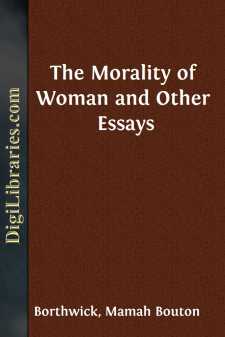Categories
- Antiques & Collectibles 13
- Architecture 36
- Art 48
- Bibles 22
- Biography & Autobiography 813
- Body, Mind & Spirit 142
- Business & Economics 28
- Children's Books 14
- Children's Fiction 11
- Computers 4
- Cooking 94
- Crafts & Hobbies 4
- Drama 346
- Education 46
- Family & Relationships 57
- Fiction 11829
- Games 19
- Gardening 17
- Health & Fitness 34
- History 1377
- House & Home 1
- Humor 147
- Juvenile Fiction 1873
- Juvenile Nonfiction 202
- Language Arts & Disciplines 88
- Law 16
- Literary Collections 686
- Literary Criticism 179
- Mathematics 13
- Medical 41
- Music 40
- Nature 179
- Non-Classifiable 1768
- Performing Arts 7
- Periodicals 1453
- Philosophy 64
- Photography 2
- Poetry 896
- Political Science 203
- Psychology 42
- Reference 154
- Religion 513
- Science 126
- Self-Help 84
- Social Science 81
- Sports & Recreation 34
- Study Aids 3
- Technology & Engineering 59
- Transportation 23
- Travel 463
- True Crime 29
The Morality of Woman and Other Essays
Description:
Excerpt
The simplest formula for the new conception of morality, which is beginning to be opposed to moral dogma still esteemed by all society, but especially by women, might be summed up in these words:
Love is moral even without legal marriage, but marriage is immoral without love.
The customary objection to this tenet is that those who propose it forget all other ethical duties and legitimate feelings in order to make the sex relationship the center of existence, and love the sole decisive point of view in questions concerning this relationship. But if we except the struggle for existence—which indeed must be called not a relationship of life but a condition of life—what then can be more central for man, than a condition decreed by the laws of earthly life—the cause of his own origin? Can one imagine a moment which penetrates more deeply his whole being?
That many men live content without the happiness of love, that others after they attain it seek a new end for their activity, proves nothing against the truth of the experience that for men in general the erotic relation between man and woman becomes the deepest life determining factor, whether negatively, because they are deprived of this relation or because they formed it unhappily; or positively, because they have found therein the fullness of life.
The depreciation for mankind of the significance of the sex relation and of the significance of love in the sex relation brings into it all the immorality still imposed by conventionalism as morality.
We no longer consider, as in our mother's youth, ignorance of the side of life which concerns the propagation of the race the essential condition of womanly purity. But the conventional idea of purity still maintains that the untouched condition of the senses belongs to this conception. And it would be right, if the distinction were made between purity and chastity. Purity is the new-fallen snow which can be melted or sullied; chastity is steel tempered in the fire by white heat. For chastity is only developed together with complete love; this not only excludes equally all partition among several but also makes a separation between the demands of the heart and the senses impossible. The essence of chastity is, according to George Sand's profound words: "to be able never to betray the soul with the senses nor the senses with the soul" ("de ne pouvoir jamais tromper ni l'ame avec les sens ni les sens avec l'ame"). And as absolute consecration is its distinctive mark, so is it also its demand. This alone is the chastity which must characterize the family life and form in the future the basis of foundation for the happiness of the people.
Literature was, therefore, wholly justified when in the name of nature it attacked the hyperidealistic subtlety which raised the love of the heart to the highest rank and made that of the senses the lowest; and when it desired that the woman should not only know what complete love was but that she should also when she loved desire that completeness.
Because from time to time powerful voices were raised, like George Sand's or Almquist's, calling without consideration not only that marriage immoral which was consummated without mutual love but also that marriage immoral which was continued without mutual love—a purer consciousness has awakened in questions regarding the conditions of the genesis of the unborn race and elevated the conditions of the personal dignity of man and woman....


